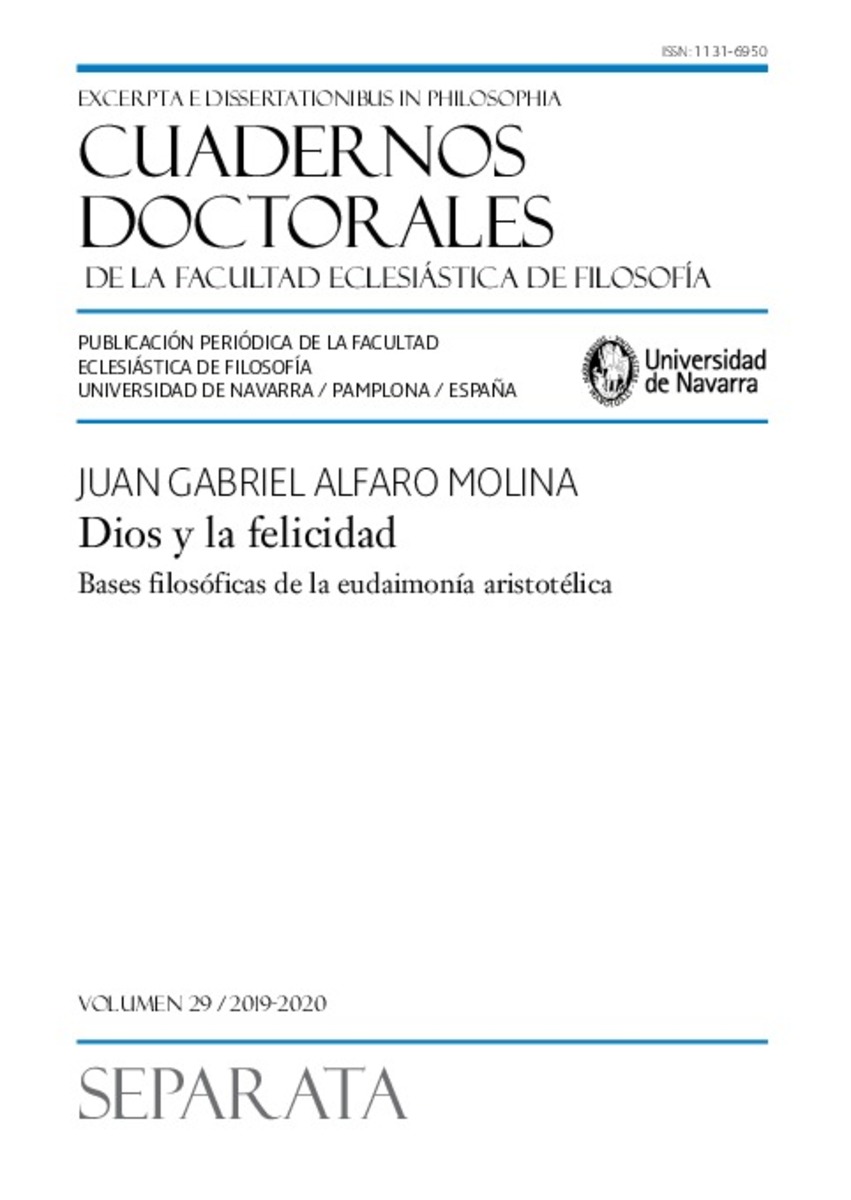Full metadata record
| DC Field | Value | Language |
|---|---|---|
| dc.creator | Alfaro-Molina, J.G. (Juan Gabriel) | - |
| dc.date.accessioned | 2020-09-10T11:22:42Z | - |
| dc.date.available | 2020-09-10T11:22:42Z | - |
| dc.date.issued | 2019 | - |
| dc.identifier.citation | Alfaro-Molina, J.G. (Juan Gabriel). "Dios y la felicidad. Bases filosóficas de la eudaimonía aristotélica". Cuadernos Doctorales de Filosofía. Excerpta e dissertationibus in Philosophia. 29, 2019, 255 - 323 | es |
| dc.identifier.issn | 1131-6950 | - |
| dc.identifier.uri | https://hdl.handle.net/10171/59349 | - |
| dc.description.abstract | La presente investigación argumenta sobre la importancia del dios aristotélico para la felicidad humana. El motor inmóvil se constituye tanto en modelo de vida como fuerza interna que atrae al individuo. Dios es modelo de vida para el hombre porque es pensamiento en sí mismo (libro Λ de la Metafísica), y para Aristóteles la actividad que hace máximamente feliz al hombre es la del intelecto, es decir, la vida contemplativa (libro X de la Ética a Nicómaco). Dios es fuerza interna porque mueve por deseo e intelección, es decir, atrae a todas las cosas hacia sí, por eso la Ética a Nicómaco inicia diciendo: «todas las cosas tienden al bien» EN 1094a. 1-2. Dios es el centro de la diana a la cual apunta el arquero a la hora de lanzar su flecha (EN 1094a. 18-24), modelo de la máxima felicidad. | es_ES |
| dc.description.sponsorship | The present investigation argues on the importance of the Aristotelian god for human happiness. The inmobile motor constitutes both a model of life and an internal force that attracts the individual. God is a model of life for man because he is thought in himself (book Λ of Metaphysics), and for Aristotle the activity that makes man most happy is that of the intellect, that is, the contemplative life (book X of the Nicomachean Ethics). God is an internal force because he moves by desire and intellection, that is to say, he attracts all things to himself, that is why the Ethic to Nicómaco begins by saying: «all things tend to good» EN 1094a. 1-2. God is the center of the target to which the archer points when launching his arrow (EN 1094a. 18-24), model of maximum happiness. | es_ES |
| dc.language.iso | spa | es_ES |
| dc.publisher | Servicio de Publicaciones de la Universidad de Navarra | es_ES |
| dc.rights | info:eu-repo/semantics/openAccess | es_ES |
| dc.subject | Felicidad | es_ES |
| dc.subject | Dios | es_ES |
| dc.subject | Contemplación | es_ES |
| dc.subject | Bien | es_ES |
| dc.subject | Happiness | es_ES |
| dc.subject | God | es_ES |
| dc.subject | Contemplation | es_ES |
| dc.subject | Good | es_ES |
| dc.title | Dios y la felicidad. Bases filosóficas de la eudaimonía aristotélica | es_ES |
| dc.type | info:eu-repo/semantics/article | es_ES |
| dc.publisher.place | Pamplona | es_ES |
| dadun.citation.endingPage | 323 | es_ES |
| dadun.citation.publicationName | Cuadernos Doctorales de Filosofía. Excerpta e dissertationibus in Philosophia | es_ES |
| dadun.citation.startingPage | 255 | es_ES |
| dadun.citation.volume | 29 | es_ES |
Files in This Item:
Statistics and impact
Items in Dadun are protected by copyright, with all rights reserved, unless otherwise indicated.






